 Petzlover
Petzlover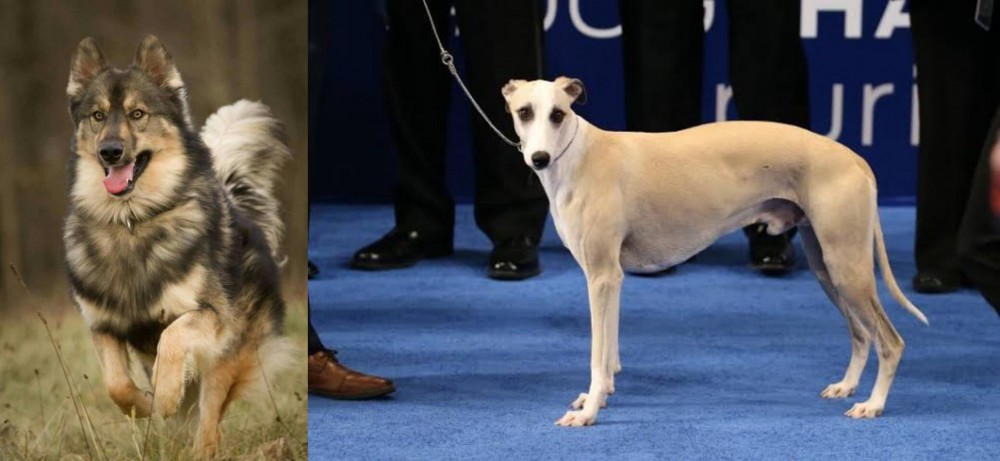 Native American Indian Dog is originated from United States but Whippet is originated from United Kingdom. Native American Indian Dog may grow 22 cm / 8 inches shorter than Whippet. Native American Indian Dog may weigh 107 kg / 236 pounds more than Whippet. Native American Indian Dog may live 5 years more than Whippet. Both Native American Indian Dog and Whippet has same litter size. Native American Indian Dog requires High Maintenance. But Whippet requires Low Maintenance
Native American Indian Dog is originated from United States but Whippet is originated from United Kingdom. Native American Indian Dog may grow 22 cm / 8 inches shorter than Whippet. Native American Indian Dog may weigh 107 kg / 236 pounds more than Whippet. Native American Indian Dog may live 5 years more than Whippet. Both Native American Indian Dog and Whippet has same litter size. Native American Indian Dog requires High Maintenance. But Whippet requires Low Maintenance
 The Native American Indian Dog is an ancient breed, that some consider to be feral. It is a landrace breed that developed with the indigenous peoples North America. These dogs originally looked and sounded like wolves and it is likely that their ancestry is tied to wolves crossed with pre-Columbian American dogs that came to the America’s with the first peoples. There are some that believe the Native American Indian Dog is a connecting line back to the dogs or wolves that over 12,000 years ago were the first to be domesticated by human beings.
The Native American Indian Dog is an ancient breed, that some consider to be feral. It is a landrace breed that developed with the indigenous peoples North America. These dogs originally looked and sounded like wolves and it is likely that their ancestry is tied to wolves crossed with pre-Columbian American dogs that came to the America’s with the first peoples. There are some that believe the Native American Indian Dog is a connecting line back to the dogs or wolves that over 12,000 years ago were the first to be domesticated by human beings.
They are now a rare breed in the wild and a small group of domesticated dogs. Fossil studies in recent years suggests that the Native American Indian Dogs came to North America about 4500 years after the first indigenous peoples. It is believed that the Native Americans bred the dogs that traders and explorers brought with them to the native coyote as well. This created a breed specific to North America and called the Common Native Dog or the Common Indian Dog. The original NAID was a mix of many different breeds of dogs and wild canines.
Today’s NAID is said to be raised on Indian reservations in the United State and represent a mix of Chinook, Husky, German Shepherd Dog and Malamute, along with perhaps some of today’s wolf mixed in. This dog is raised domestically and is socialized to life with humans. They are the last remaining breed from all the Native North American dogs that lived with the original people of the Americas. They are also thought to have an ancestry similar to the Australian Dingo.
They are a devoted, protective and loyal breed though they tend to be shy. They need to be outside for the majority of the day and don’t do well in crates. They need a fenced yard and room to roam. They are working dogs that hunted, pulled sleds and guarded their homes. They still need a job to so.
Today the North American Indian Dog is being bred to replicate the temperament and appearance of the originals. Although there are many breeders working from the founding breeder with original stock, there are only six that are officially given authorization to breed the NAID. They are registered by Terra Pines with the National Kennel Club but not recognized by the AKC and UKC.
The breed name NAID is trademarked by Karen Markel of Majestic View Kennels in the 1990’s. Today the breed is nationally recognized as a breed very much like the original Native American dogs, The breed is intelligent and quite healthy. They enjoy people and engage in many companion activities.
Whatever its true ancestry the current Native American Indian Dog (NAID), today’s version is not recognized by the AKC, but they are recognized by the Dog Registry of America, the Native American Indian Dog Registry and the National Kennel Club.
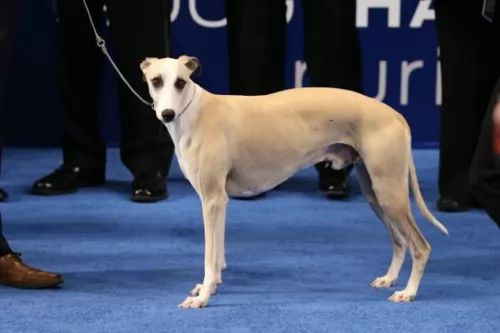 You can just see that Whippets are designed for speed with those super lean, slender bodies. They were developed by crossing Greyhounds with smaller terriers.
You can just see that Whippets are designed for speed with those super lean, slender bodies. They were developed by crossing Greyhounds with smaller terriers.
In open areas, they can pick up a high speed. In the 19th century in certain parts of England, they were used in races. They actually originated in England.
The Whippet is an ancient dog breed if you can go according to artwork which dates back to ancient Egyptian times.
They were also known as Snap dogs or small Greyhounds. You can say that the modern Whippet emerged in 1891. This was when the Kennel Club gave the breed official recognition. It was in 1888 that the dog was recognized by the American Kennel Club.
 There are two sizes of the North American Indian Dog – they are medium and large. They have dense short double coats, or they have long top coats and a fairly dense undercoat. They come in a variety of colors mostly black or silver but there is also a tortoiseshell. These tortoiseshell colored dogs are considered by Native Americans to be sacred beings. These tortoiseshell dogs are strikingly good looking and are called Spirit Dog.
There are two sizes of the North American Indian Dog – they are medium and large. They have dense short double coats, or they have long top coats and a fairly dense undercoat. They come in a variety of colors mostly black or silver but there is also a tortoiseshell. These tortoiseshell colored dogs are considered by Native Americans to be sacred beings. These tortoiseshell dogs are strikingly good looking and are called Spirit Dog.
They all have the look of a Siberian Husky or Alaskan Malamute with upright ears and almond shaped eyes that are anywhere from amber to brown with some blue. Usually their tails are down and long but can be curled. They resemble the wolf and have that wild, feral appearance. They can be as large as over one hundred pounds or average seventy to eighty pounds. They are strong, alert and intelligent. They are considered to be hypoallergenic, shedding their coat only once a year.
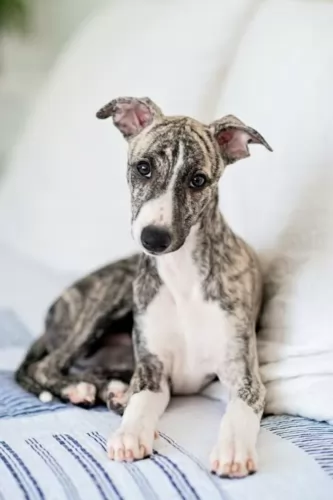 The Whippet is a medium-sized sighthound breed standing at between 45–56cm in height and weighing anything between 6 and 13kg.
The Whippet is a medium-sized sighthound breed standing at between 45–56cm in height and weighing anything between 6 and 13kg.
They descended from Greyhounds, resembling them in looks, just smaller. They are part of the Hound group, It’s a deep-chested dog with a long, lean head with fairy large eyes, a long neck, floppy ears and slim legs. The tail is long and slender. The coat is short and smooth and comes in many colors – tan, silver, black white, brindle and bi- or tri-colored.
The Whippet loves to run but when they’re not prancing around, they love spending time with their human family and that includes other pets as well as children.
They’re demonstrative and love showing their love for their family. They’re able to adapt to life in the city or the countryside but they will need exercising.
This is also a dog that rarely barks. They’re willful dogs so will do well with training and socialization. In fact, without proper socialization, they can become timid in unknown environments. They're intelligent so wont have problems with learning.
If you’re looking for a good watchdog and protector, you won’t find these characteristics in the Whippet.
 This breed is gentle and loving with children.
This breed is gentle and loving with children.
Endurance, strength and good health.
Low adaptability to small living spaces and lack of outside space; don’t do well in crates and need an experienced dog owner.
They are highly intelligent, love to learn and are just a little stubborn.
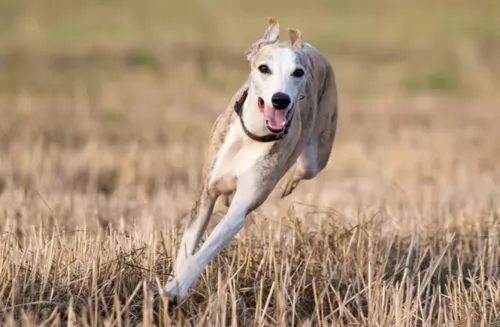 When you bring a sweet-natured Whippet into your life and home you’ll discover that apart from reveling in having a good run, their next favorite thing is to be resting quietly wherever their human companions are.
When you bring a sweet-natured Whippet into your life and home you’ll discover that apart from reveling in having a good run, their next favorite thing is to be resting quietly wherever their human companions are.
They’re docile dogs, loving to snuggle up to you, and not enjoying the cold. These quiet, gentle dogs are totally non- aggressive, just wanting to be with you, making you a splendid companion and pet.
 This is a fairly healthy, long lived breed having spent so much of its history in isolation. They are prone to some of the issues that affect all medium to large breeds.
This is a fairly healthy, long lived breed having spent so much of its history in isolation. They are prone to some of the issues that affect all medium to large breeds.
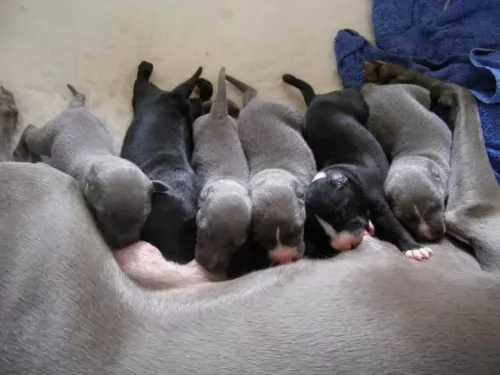 The lean Whippet doesn’t have any particular health problems but it is always a good idea to be clued up on some of the more common dog diseases there are.
The lean Whippet doesn’t have any particular health problems but it is always a good idea to be clued up on some of the more common dog diseases there are.
Buying a Whippet puppy from a responsible breeder will help with ensuring a healthier dog as dogs like these have had a good start and will have been vaccinated and dewormed.
This is when the heart of the dog beats too fast or too slow or it may even skip a beat. It is fairly common in dogs and it could indicate a more serious underlying condition.
An irregular heartbeat can bring about physical weakness and even loss of consciousness. Your veterinarian will want to examine your dog and listen to the history of symptoms and events that could have led to the condition. Your vet will then discuss treatment.
 Because of their propensity to grow to quickly the puppy should only stay on puppy food for 8-10 months. Feed them a high quality large dog puppy food 3-4 times daily for a total of 2-21/2 cups per day.
Because of their propensity to grow to quickly the puppy should only stay on puppy food for 8-10 months. Feed them a high quality large dog puppy food 3-4 times daily for a total of 2-21/2 cups per day.
Feed a high protein, large dog dry food twice a day for a total of two cups. Do not over feed. Do not feed right before or after exercise do to the risk of bloat.
Healthy, strong long lived dog.
This is not an indoor, couch potato dog. They need exercise and they need space. They won’t do well as apartment dogs unless you can take them to a dog park for over an hour every day. They really need a large fenced in yard. They don’t do well in crates either. He doesn’t understand crates and thinks you are punishing him. They make great hunters, search and rescue dogs, service dogs and therapy dogs. They will succeed at pulling competitions and weight competitions.
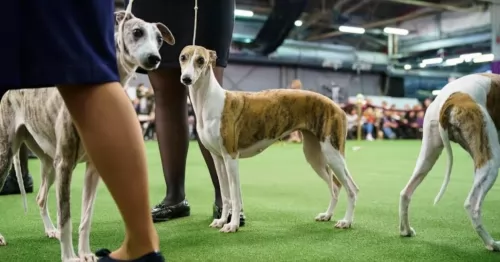 Whippets love running so if you’re lucky to live on a farm or at the beach, he will love those short bursts of speed in open places, chasing a ball. You can take him for a walk every day too.
Whippets love running so if you’re lucky to live on a farm or at the beach, he will love those short bursts of speed in open places, chasing a ball. You can take him for a walk every day too.
Whippets are looked upon as low maintenance dogs that don't shed much. A good brush twice a week will be adequate for this slender dog. The skin is vulnerable to cuts so check him over when you’re brushing him and make sure he hasn’t any sores or scrapes on the skin.
How much your adult dog eats depends on his size and his activity levels. Dogs are individuals and not all Whippets will eat the same amount of food. Puppies require 4 bowls of food a day while the adult Whippet will want 2 bowls of food.
There are excellent dry kibble dog foods on the market but your Whippet will also like some home-made food like chicken and vegetables. The quality of dog food you provide for your Whippet will make a huge difference to his health.